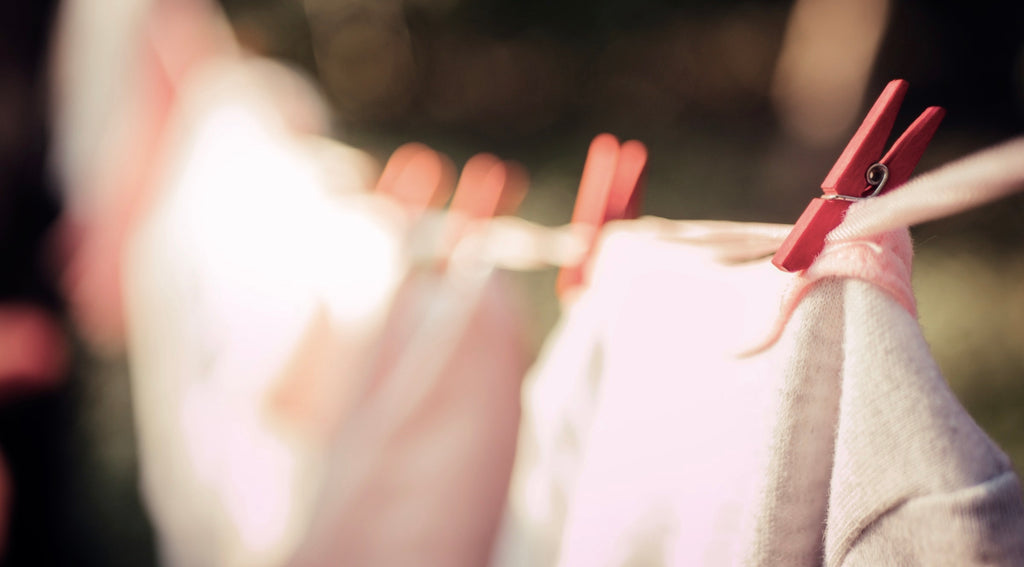Better laundry, better planet
Laundry. It may seem like an unglamorous chore, though keeping your little ones looking and feeling great, while reducing your impact on the planet, may not be as tiring as you might think.
How many times have you put a new outfit on your child without thinking about how long it will stay clean for, or how it might need to be washed to preserve its comfort and shape? Between busy working and family lives, laundry is a constant yet unavoidable task. The desire to ‘wear, wash, repeat’ might be second nature though with around 25% of a garment’s carbon footprint coming from laundry and customer care there is more you can do to reduce your environmental impact than reaching for the 30-degree button.

Buy clothing that’s made to last
At LUCA & LUCA, we use the finest materials and age-old techniques to create beautiful hand-crafted clothing that is durable, timeless and elegant. We put care and attention into how each item is made, so that it can be passed down through generations and still look and feel as good as the day it was made. A small amount of consideration, and a few conscious decisions about washing, will keep our pieces looking elegant for a long time.
Wear clothing more than once
Wearing clothes more than once before tossing them in the dirty pile is the first step in changing laundry habits. Accidents always happen and so we’re not suggesting you put dirty clothes on, though jumpers and tops that are layered over items closer to the body might need such frequent cleaning.
Go natural
Conventional detergents can contain ingredients that aren't good for delicate skin, clothing, or the ponds, pools and rivers where the dirty water can end up. Try shopping for more environmentally safe detergents, which are biodegradable and phosphate-free, and usually made from plant- and vegetable-based ingredients. They're healthier for the planet, from production to rinse cycle, and often gentler on skin, too. For softer fabrics, try using a cup of white vinegar during the rinse cycle. Vinegar naturally balances the pH of soap, leaving your clothes soft and free of chemical residue.
Cold is cool
Get familiar with the 30-degree dial on your washing machine and always check washing instructions on each garment. Some items wash as effectively at lower temperatures which means less energy and less expensive household bills. Separating your clothing by colour and composition (cottons, delicates, synthetics etc) will help you to plan washes and a laundry bag will prevent any stray fibres from synthetic items being washed down the drain and into the water cycle.
Consider washing by hand
There’s no doubt that hand washing is a time consuming and loveless task, but it can give the most delicate of items a new lease of life and prevents the rough and tumble of the washer from altering the shape of intricate stitching. We recommend handwashing all of our hand-smocked dresses, they’ve been made by hand so why not care for them by hand? To save time, you could even take them into the shower with you.

Hang up
Tumble dryers are one of the main culprits for energy usage in the household, so not using them can make a huge difference. Line-drying is inexpensive, uses the natural energy of the sun and wind and clothing generally smells and feels better afterwards. A warm, well ventilated room in your house or an airing cupboard will have the same effect. Tip: Don’t put dark pieces in bright/direct sunlight or they will fade, dry them in the shade.
Avoid dry cleaning
We would suggest not drying cleaning any of our items. The delicate nature of our fabrics can be cleaned as effectively with soap and water, than with the use of the chemical perchloroethylene which is often used in dry cleaning.
We produce all our clothing in Spain, and only with small, independent and family run suppliers. We also limit the amount of garments we create each season to ensure every collection is unique and that we are not wasting resources. Your garments is one of a precious few.
